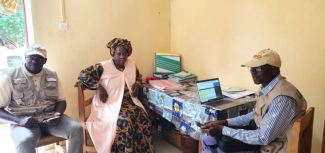Obstetric fistula (OF) remains a source of public health concern and one of the most devastating maternal morbidities afflicting Guinean women. It is still prevalent in the country due to the existence of socio-cultural practices and inadequate health services.
Obstetric fistula usually occurs when a woman experiences several days of obstructed labor and cannot access medical intervention - typically a Cesarean section - to relieve the pressure. The mortality rate of babies is high, and the woman is left with chronic incontinence with uncontrollable loss of urine and feces. Women living with fistula face tremendous stigma and shame and may live for years with the condition unaware that a cure is available.
This condition is entrenched in poverty, predominantly affecting marginalized women who lack access to quality health care. The women typically are of lower socio-economic status with no or low education levels, living in rural areas, unable to access prenatal care, may undergo harmful traditional practices where home delivery is often preferred, and were married at a younger age.
These different factors that contribute to the development of obstetric fistula put many women of reproductive age at high risk of the condition in Guinea.
In 2017, the USAID-funded Health Service Delivery (HSD) activity began making fistula repair services available within more health facilities in Guinea, and built the capacity of health workers to diagnose, treat, and prevent the condition effectively.
The activity has supported training for 15 surgeons. They are now performing surgical repairs and referring fistula cases that cannot be repaired at their units.
To date, thanks to the HSD activity, these surgeons have provided successful repair surgeries to more than 700 Guinean women since 2017.
For Dr. Mohamed Moro Touré, head of the maternity ward at the regional hospital of Kindia and one of the fistula repair surgeons trained by the HSD activity, obstetric fistula is most common among young women experiencing their first pregnancy, particularly in regions where early marriage is the norm. However, it can occur in older women and those who have successfully given birth previously.
“Fistula can be prevented by access to voluntary family planning services to help families have children at the healthiest time for mother and child. Accessible, safe delivery care is also critical to prevent fistula in women with prolonged, obstructed labor,” he added.
As part of the HSD activity, USAID’s partner Jhpiego, conducts training on fistula counseling to prepare service providers to refer women with obstetric fistula for further care; provide them with necessary information before, during, and after surgery; and advise women on reproductive health, family planning, and sexually transmitted infections.
As an early point of contact for all the patients in the USAID-supported fistula care unit in the Kindia Regional Hospital, Mariame Diaby, a nurse, and HSD-trained counselor, plays a vital role in evaluating and recognizing patient needs and concerns, providing accurate information about fistula and assisting patients in making key family planning and reproductive health decisions.
“After local radio programs have announced in local languages dates of free surgeries to help treat women with OFs, those eligible are voluntarily gathered for examination in Kindia Regional Hospital. I receive one by one for counseling those diagnosed with OF. They are well taken care of from the time they are admitted to the fistula care unit to the day they are discharged. And transportation fees are paid for everyone, from those who come from nearby villages to those who come from faraway towns,” Madame Diaby said.
After suffering from fistula for years, one of the beneficiaries we met at Faranah Regional Hospital in southeastern Guinea, where a USAID-supported fistula care unit is embedded, said: “My marriage failed, and I was abandoned by my community because of this condition. I feel good now. I have been reintegrated into society.”
USAID’s HSD activity supports increased access to quality family planning and reproductive health services. Maternal and child health efforts focus on birth preparedness, maternity services, and obstetric fistula repairs. The activity has worked to address the challenge of obstetric fistula in six health facilities in Conakry and in the regions of Boké, Kindia, Mamou, Faranah and Labé.
The activity improved the capacity of three existing obstetric fistula treatment units established from previous fistula care projects. They include the Socio-Medical Center Jean Paul II in Conakry, the Regional Hospital of Labé, and the Prefectural Hospital of Kissidougou. The Kissidougou and Labé units have the capacity to perform routine simple and complex obstetric fistula surgeries.
The HSD activity ends in December 2022. However, the activity has been working closely with the USAID central mechanism Momentum implemented by Engender Health and the United Nations Populations Fund (UNFP), to ensure continuity and sustainability.

Ousmane Condé, USAID Guinea
